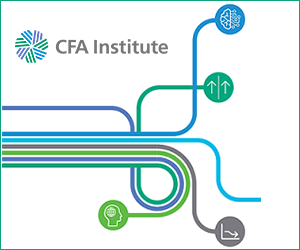
CFA touts purposeful capitalism
PURPOSEFUL CAPITALISM
A CFA Institute report states that purposeful capitalism means leadership, trust and a higher social purpose – the keys to a sustainable future for the investment profession.
READ MORE
CFA TOUTS PURPOSEFUL CAPITALISM
The investment profession runs the risk of becoming irrelevant unless it aligns its interests with those of its clients, and demonstrates that it serves a clear and meaningful social purpose, states CFA Institute’s landmark analysis of the industry, Future State of the Investment Profession.
As the paper states, “purposeful capitalism” is one of four scenarios for the future of the profession identified by CFA Institute in its paper report (see box, “The Four Scenarios”). It posits that whether the investment profession fulfils its potential to serve a greater purpose depends on the quality of organisational leadership that emerges in coming years.
Without strong leadership and a solid foundation of trust, the profession runs the risk of losing its social licence to operate.
“Attempts are made in this scenario to improve the markets’ moral compass and mechanisms consistent with the fundamental tenet that financial markets should be fair and efficient,” the report states.
“This scenario takes an optimistic view that recent declines in public market issuance do not turn into lasting damage. The system requires a healthy balance of listed and unlisted capital to support the fundamental transactions that support innovation. The system is stronger with diversity of thinking and actions.”
Purposeful capitalism is ultimately built upon a platform of trust – trust in all actors in the investment profession. The Future State report explains that in the absence of trust, the costs of conducting business rise, or transactions do not occur at all.
“Trust is thus a powerful, positive force, and a stronger and more purposeful system will require improvements on the weak current starting position,” the report states.
The CFA Institute report explains that a purposeful capitalism scenario requires asset owners to consider whether they’re prepared to accept “possibly lower returns” in exchange for improved long-term system sustainability.
This is no small matter. As the report states, it requires nothing short of “a shift in mindset, in which asset owners and investors take a holistic view of investing, applying ecosystem thinking over a long-term horizon”.
Underpinning this view is the idea that asset owners need to act with greater clarity on their responsibilities to stakeholders, and to the time horizons that matter.
“Universal owners” of assets – asset owners able to take long- term views on investments – must recognise that they “own, and will always own a slice of the whole economy”. And while their ability to sell may be limited by their size, the CFA Institute report states that they “can adapt their actions to try to help the whole economy/market to a more prosperous and sustainable future”.
While they may be thinking mostly about effective long-term finance, it is also the case that an “ability to reduce their portfolio exposures to society’s externalities will often represent both a private gain and a public good”.
“All of these issues involve multiple strands and legions of judgements,” the report states.
“In this scenario, the opportunities for leadership from investment institutions are significant. What crystallises in this scenario on the spectrum of outcomes depends on the quality of leadership that emerges.”
Roger Urwin, FSIP, global head of investment content for Willis Towers Watson, CFA Institute Future of Finance Advisory council chair and co-author of the paper, says practitioners and businesses theoretically have a choice of whether to embrace the concept of purposeful capitalism – in which a capitalist system that progresses more inclusively wins out over a system that stays self-serving to those in finance – or to ignore it. However, he says, in practice there’s only one choice.
Urwin says the purposeful capitalism scenario presents an upbeat view of the world, “where investment organisations adapt and do good work with respect to their social licence to operate”.
He explains: “The industry as we have it kind of needs to be adaptive, to be prepared to deal with a very challenging environment by delivering more to their clients and – either directly or indirectly – to society than they have to themselves.”
Urwin says the investment industry has done well for itself, but the benefits of what it does have been “pretty ho-hum” for society as a whole.
“And that’s a big deal,” he says.
Rebecca Fender, CFA, head, Future of Finance, CFA Institute, says that under the purposeful capitalism scenario, the possibility of a truly professional industry emerges, one that is trusted and that delivers clear and well-understood value to consumers and to society.
It is built on a solid foundation of ethical behaviour, leading to trust, and is granted a clean licence to operate. It’s in this quadrant where the industry and the professionals that work within it will flourish, and where society will benefit most from what the investment profession does.
“That’s where you get a win-win,” Fender says.
The Future State of the Investment Profession report’s findings are based on a survey conducted in December 2016 of 140,000 members of CFA Institute and the readers of Institutional Investor. The survey generated 1145 responses, and these results were followed up with interviews of 19 investment management executives.
IMPACT ON INVESTMENT ORGANISATIONS IN THE PURPOSEFUL CAPITALISM SCENARIO
• Firms must align themselves with a rapidly changing, disintermediated and networked world, where governance issues are challenges often weakly understood and hard to fix.
• Organisational diversity is recognised as a key ingredient for surviving and thriving in an increasingly complex operating environment.
• Asset owner institutions adopt a more influential role in the investment ecosystem through greater collaboration; they focus more on longer-term value creation and give greater attention to sustainability.
• There is fierce competition for talent among investment organisations, particularly at the leadership level; diversity and culture are big factors in attracting employees.
• Firms focus on stakeholders and incorporate systems thinking to better understand the ways that they affect the environments in which they operate. Investment organisations manage themselves to improve the value and overall trust in the investment ecosystem and are increasingly transparent in these parameters through integrated reporting.
• Identifying preventable surprises and managing to avoid them is given increasing attention, reflecting greater hazards in the complexity and interconnectedness of managing investment organisations.
Source: Future State of the Investment Profession, CFA Institute
SCENARIO 4: PURPOSEFUL CAPITALISM
Capitalism’s way of working evolves; the investment industry raises its game with more professional, ethical and client-centric organisations acting in aligned-to-purpose, lower-cost, and efficient ways.
MAJOR ELEMENTS
• Governments and firms work towards a more positive direction of travel for capitalism, with more respect for wider stakeholders.
• Markets for publicly listed equity and private equity are more fair, efficient, and deep over time – and grow as a result.
• Firms and investment organisations integrate their wider purpose alongside their profit motivations.
• Asset owners are more influential; they add focus to longer-term value creation and sustainability.
• There is increased attention to fiduciary responsibility in investment, with better alignment.
• There is fierce competition for leadership talent among investment organisations; diversity and culture are draws.
• Investment providers need to have a “clean licence to operate”, including environmental, social and governance principles.
Source: Future state of the investment profession, CFA Institute
THE FOUR SCENARIOS
Fintech disruption
New technologies promote new business models; disruption and creative destruction
are endemic; challengers do better than incumbents; major disruptions to the world of work
Parallel worlds
Different segments – defined by geography, generation and social group – engage in society differently; a higher baseline for financial services participation with wider dispersion; product preferences for personalisation, simplicity and speed
Lower for longer
New normal low interest rates and returns become embedded for the foreseeable future (5–10 years), accentuated by lower levels of global growth and higher levels of political instability
Purposeful capitalism
Capitalism’s way of working evolves; the investment industry raises its game, with more professional, ethical, and client-centric organisations acting in aligned-to-purpose, lower-cost, and efficient ways
Source: Future State of the Investment Profession, CFA Institute

The lower-for-longer future
LOWER FOR LONGER
A new report from the CFA Institute shows that asset-owner organisations face a future in which they’ll be unable to generate the returns they need – forcing the entire industry to adjust.
READ MORE
THE LOWER-FOR-LONGER FUTURE
A lower-for-longer investment scenario will almost inevitably be negative for existing investment industry business models, according to a landmark analysis of the investment profession by the CFA Institute.
The paper states asset-owner organisations will be unable to generate the investment returns they need to meet liabilities and other targets.
Asset managers cannot rely on growth in investment portfolios to produce increases in assets under management, and “their clients are increasingly resistant to paying previous-era fee levels, because they represent too dear a cost against lower gross returns”.
Even though fee pressure has been brought to bear on asset managers by asset owners, the paper states, most major asset owners still expect that manager margins to increase. Yet just over a third of asset managers themselves expect the same thing.
Asset management margins have historically been resilient but it’s difficult to be as optimistic this time around, given “low growth in new money, lower returns and reducing fee rates”, the report states. It may be possible for asset managers to contain some costs using technology, but increases in costs in other areas, including compliance, appear unstoppable.
Rebecca Fender, head of the future of finance at CFA Institute, says the lower-for-longer scenario will challenge all investment professionals to assess the value they provide to investors and to think carefully about the role the industry plays broadly in society.
“It is really to say, envision a five- to 10-year period where you have a relatively low-growth, low-return environment – what does that mean for business models?” Fender says.
Roger Urwin, FSIP, global head of investment content for Willis Towers Watson, CFA Institute Future of Finance Advisory Council chair and co-author of the report, says the implication of the lower-for-longer scenario is that “products have to be adaptive to those conditions of lower returns, where cost structures are just not sustainable”.
He says this scenario will affect how the financial services industry provides secure and reliable income for individuals as they enter retirement. And to an extent, there are intergenerational issues, he says, because if this is not addressed appropriately it could lead to one generation being advantaged at the expense of another.
“This is an intergenerational stretch and it’s not a happy situation,” Urwin says.
“Intergenerational equity issues get called out, and we get a pensions crisis. The pensions crisis is more acute where defined benefits exist; defined contribution, though, produces some of the same issues, and you can’t escape just because you’re defined contribution.”
The report states that a future in which consistent investment returns are difficult to generate will lead to “an existential crisis of sorts” for investment organisations. Those that navigate it successfully will be led by strong leaders who have a clear vision and five key skills:
• An ability to articulate a compelling vision for the institution
• Crisis-management skills
• Relationship-building skills
• Specialised financial analysis skills
• An understanding of corporate governance/regulations
“In particular, asset owners will find that their targets are difficult to meet and beneficiaries will be troubled; this may require crisis-management skills at the extreme,” the report warns.
It states the ability to communicate with clients and other stakeholders will take on greater significance. Managing and building relationships in a low-return environment and excellent customer service may be skills that help one organisation differentiate itself from its competitors.
Dealing with regulators takes on a different complexion in a lower-for-longer scenario as well.
The report goes on to state that, “There is a natural likelihood that weak investment returns will map to increases in regulation and even regulatory overshoot.”
The CFA Institute states that all the scenarios it identifies in Future State of the Investment Profession analysis are “opportunities for innovative investment organisations to begin selling something other than the promise of retirement”.
“Notably, firms could reorient themselves to providing fulfilment during all ages of a person’s life, rather than delayed fulfilment toward the end of life,” it explains.
KEY IMPACTS OF A LOWER-FOR-LONGER SCENARIO
• Too much supply of capital (caused by too low interest rates) combines with slowing demand for capital because of ageing demographics in the developed world, resulting in prolonged and slow economic growth.
• When the pie is not growing, the whole finance sector struggles; institutional flows into pension funds are curtailed as pension savers recognise the deterioration in outcomes that are likely in conditions of financial repression.
• Leadership is critical in adverse circumstances; strife around global entitlements, including pensions, is likely, so asset owners will need to renegotiate terms with beneficiaries, and set proper expectations for the future.
• Success for investment organisations means getting more intimately involved with clients and their many daily financial decisions.
SCENARIO 3: LOWER FOR LONGER
New normal low interest rates and returns become embedded for the foreseeable future (5–10 years), accentuated by lower levels of global growth and higher levels of political instability.
MAJOR ELEMENTS
• Limited success with interest rate normalisation; natural interest rates stay low
• Growth challenges: indebtedness, adverse demography, excess savings, China/emerging markets, companies hoard cash
• Large gaps in pension coverage with longevity; pension poverty
• Moves to lower-cost, higher-tech investment solutions, premium on innovation, industry consolidates
• Private markets carry growing weight in capital raising; issues with opaqueness, liquidity, agency, overcrowding
• Corporate and public pension costs rise to pay for increased longevity and reduced returns
• Disappointment with outcomes rubs off on trust; investment skill under pressure to demonstrate its value
• Geopolitical instability connects with social instability; inequality fissures; negative feelings deepen; job fears; immigration challenges
Source: Future state of the investment profession, CFA Institute

Investment industry faces greater demand for personalisation
Parallel Worlds
In the second of a four-part series, CFA’s Roger Urwin and Rebecca Fender discuss how a segmented society is creating challenges and opportunities for investment professionals in reshaping their offerings and business models.e.
READ MORE
INVESTMENT INDUSTRY FACES GREATER DEMAND FOR PERSONALISATION
PART 2
SCENARIO 2: PARALLEL WORLDS
Demand from consumers for individualised, tailored financial services presents challenges and opportunities for investment professionals to redefine offerings and create new business models, according to a new a study by CFA Institute.
Changing demographics and tech-empowered individuals are two global megatrends that underpin a “parallel words” scenario, one of four possible scenarios mapped out for the financial services industry in the CFA Institute study, Future State of the Investment Profession.
Roger Urwin, FSIP, global head of investment content for Willis Towers Watson, CFA Institute Future of Finance Advisory Council Chair and co-author of the paper, says the parallel worlds scenario is “really a recognition of something that’s been coming in obvious ways: that people are much more individual in their expectations of their way of engaging with society and their lifestyles”.
And while that is already clear of consumers in developed financial markets, it will increasingly become true of consumers in markets that are not yet fully developed, and among groups who have not traditionally been targets of the financial services industry.
Urwin says the parallel worlds scenario has ramifications for political, economic and investment players, as new “economic actors” become viable target markets for financial services.
Rebecca Fender, CFA, head, Future of Finance, CFA Institute, says the parallel worlds scenario is “fuelled by social media to some degree – so there’s this ability to ‘see into’ these other worlds”.
The CFA Institute study says the impact of the parallel worlds scenario will be felt wherever there are groups that have been excluded from the financial services industry’s traditional scope, underpinned by the use of technology, and in particular social media, to empower greater numbers of individuals.
This scenario describes implications of the disenfranchised and excluded gaining insights into how “the other half” lives. These new groups could include women, minorities within countries with clear majorities, and politically and economically underdeveloped regions.
“In turn, this causes a refusal to remain disenfranchised and a ‘reaching up’ to new opportunity,” the study says.
Technology will then play its part in “reaching down”, enabling new products and services to be tailored for these emerging consumers.
Urwin comments that this scenario addresses “how Millennials are viewing their ambitions and their way of dealing with things, which is so different from the way the Baby Boomers do.
“More and more individuals know what they want and need, so the parallel worlds scenario is saying these segments can exist in parallel, but they are different.”
Urwin says that while each of the new, emerging segments may not “recognise each other tremendously well, or know each other tremendously well”.
“That is quite a big deal” he says.
“What you’ve got here are degrees of division in society, as opposed to a single cohesive society. This is the spectrum of stuff – geopolitical, social and investment-related – and [the report] uses ‘parallel worlds’ to point out how to see the implications of this division of society into segments, and the opportunities and risks and challenges that exist to investment players to do that job properly.”
RECOGNISE THE TREND, EMBRACE THE SCENARIO
The CFA Institute study says there is “vast potential to reach customers and to do so exactly where they want to be reached”. “In sum, it is a marketer’s dream come true”. But the opportunities will be greatest for organisations that recognise the underlying megatrends, and embrace the scenario as it unfolds.
It says successful businesses will embrace the opportunities, but be cognisant of the potential downsides – which can include vulnerability to reputational damage through rapid communication via social media and issues going viral.
“For corporations, it’s important to note that trust and brand are very important assets, and managing your reputation in this era is harder, because something can go viral and then you have a crisis on your hands,” Fender says.
“The other element, I would say, that draws on Roger’s point about personalisation, is we would purport that the whole concept of what a ‘luxury’ good is, is evolving. It’s not necessarily about the highest price tag; it’s about being customised just for me.
“And that’s what Millennials expect. This creates a great opportunity for the industry to use big data, to process it well and to know their customers better to provide great value.”
PICKING THE TRENDS
Urwin says CFA’s work on the Future State of the Investment Profession report is “meta-study based” and picks up on work carried out elsewhere on identifying key global megatrends.
He says that “to get scenarios straight you have to see the transformational change dimensions – the six megatrends – as the starting point to the thinking”.
“So the core to the thinking is doing ecosystem work,” he says.
“Not everyone does it that way, and we think it’s obvious that you should do it that way, but candidly, the investment industry has different methods here and we’re a broad church, accepting that.”
The CFA Institute study findings are based on a survey conducted in December last year of its 140,000 members and the database of Institutional Investor. The survey generated 1145 responses, and these results were followed up with interviews of 19 investment management executives.
Urwin says megatrends have “impacts on a wide basis across different spheres”.
“But what we’ve done here is use the [financial services] ecosystem structure to map them into the investment industry,” he says.
Fender says the scenarios identified by the CFA Institute are “tools for organisations to examine their business models and in all probability, adapt those business models”.
“Things need to change,” she says.
“When the world outside is changing so fast it’s very unlikely that the business model you’ve got at the moment is fit for purpose.”
SCENARIO 2: PARALLEL WORLDS
Different segments – by geography, generation and social group – engage in society differently; a higher baseline for financial services participation with wider dispersion; product preferences for personalization, simplicity and speed
MAJOR ELEMENTS
• Better worldwide education, healthcare and telecoms increase societal engagement
• Social media carries potency to bring people together and to divide, legitimately and illegitimately
• Potential for mass disaffection; consequences in anti-globalization, populism, and authoritarian nationalism
• New-style financial institutions enabling personalized, simple, and speedy engagement; trust is also needed
• Big data serves customization of investment products to specific segments; more reflection of personal values
• Improvement in financial literacy and empowerment produce better financial participation
• The “have-nots” act on their disillusionment with the system
• The trustworthiness of the tech model with tangible products and immediate gratification is tested in investment contexts
Source: Future state of the Investment Profession, CFA Institute.
ON-TREND
Six megatrends, or “transformational change dimensions”, will translate into the financial services industry in the form of four possible scenarios: fintech disruption, parallel worlds, lower for longer, and purposeful capitalism.
The CFA Institute study says the six key global trends underpinning those scenarios are:
• Aging demographics
• Tech-empowered individuals
• Tech-empowered organizations
• Economic imbalances
• Government footprint and
• Resource management
Source: Future state of the Investment Profession, CFA Institute.

Constant pressure to keep up with change
Fintech disruption
In this four-part series, we will examine the challenges investment professionals face, the skills they need to meet those challenges, and four possible (although not mutually exclusive) ways, dubbed “scenarios,” in which the future of the investment profession could unfold. The first story examines the impact of fintech and the disruption to the finance sector.
READ MORE
Constant pressure to keep up with change
The growing influence of asset owners around the world is a driving force for the investment profession to achieve better results for society, states a new report the CFA Institute has published.
The report, Future State of the Investment Profession, sets out key challenges facing investment professionals – arising from the impact of global megatrends on the financial services ecosystem – and identifies potential responses that will underpin improved services and businesses that better serve investors and society.
Rebecca Fender, CFA, head, Future of Finance, CFA Institute, says asset owners around the world must “recognise their growing influence in the ecosystem and use it wisely”.
“Their expectations for the industry will help drive it,” Fender says.
She says a critical aspect of success for pension, sovereign wealth and superannuation funds will be for the leaders of those entities to identify probable future scenarios and respond to them quickly and decisively. A wait-and-see approach is not an option, she says.
The CFA Institute report’s findings are based on a survey conducted in December last year of its 140,000 members and the database of Institutional Investor. The survey generated 1145 responses, and these results were followed up with interviews of 19 investment management executives.
In addition to survey data and input from interviews, the paper outlines a backdrop of six megatrends – aging demographics, tech-empowered individuals, tech-empowered organisations, economic imbalances, government footprint and resource management – which are by no means unique to finance. However, they affect the various stakeholders in financial services and produce four possible scenarios.
The report expands on the four possible scenarios: fintech disruption, parallel worlds, lower for longer, and purposeful capitalism. Each presents its own set of challenges, and irrespective of which scenario is deemed more likely to play out, “leaders need to move quickly, not incrementally”, Fender says.
She explains that the scenarios identified in the paper are “not mutually exclusive and these are not guaranteed, but … as you’re creating your fund’s or firm’s strategies, if you see these trends and there are implications for you, you should move, because in many ways, the rules of the game have changed”.
“There are major disruptions coming, from clients, technologies and the skills that will be needed for success,” Fender says. “We’ve talked about an inflection point for the industry, and we don’t want to be overly dramatic here but, essentially, what that implies is there can be a bigger gap going forward between those that are successful and those that flounder. Time is of the essence.”
Skills necessary for success
Fender says the Future of Finance report examined the skills likely to be required for successful leaders. In the world of asset owners, a strong focus on – and ability to deal with – corporate governance issues and changes to legislation are expected to be paramount.
“Elements around crisis management are more important in this world, too,” she says. “And I think that makes sense as we consider potential disruption ahead and dealing with, essentially, broken promises. There are expectations on payouts that may not come to pass, so you will need some very strong leadership to get through those times.”
“It’s a little tricky because we’re not saying exactly what to do – you can’t simplify it that much,” Fender says. “You need to understand all the intricacies of the stakeholders and this is all path-dependent. It depends on your starting point.
“We see how behavioural finance and understanding our biases more have started to change the thinking in the industry. One of the biases out there is toward action: ‘I don’t know what to do [but] I have got to do something.’ I would guard against that, but still say the wait-and-see approach is not the appropriate one at the moment.”
The trend toward greater use of technology in finance is the most-discussed scenario among the four that CFA Institute has identified, says Roger Urwin, FSIP, global head of investment content for Willis Towers Watson, CFA Institute Future of Finance council member and co-author of the paper.
“It permeates everything we do and it’s where the change is fastest,” Urwin says of technology. “The distribution of change coming from technology is obviously quickest, because the quality of the impacts of technology are accelerating. The difference between a constant rate of change and an accelerating rate of change is captured in the fintech scenario. The others are a little bit more, I wouldn’t say straight line – we don’t like straight lines here – but they are less accentuated.”
Fintech’s twofold impact
Urwin says the impact of fintech is twofold. First of all, it affects the range of traditional finance sector activities by automating or commoditising them. Secondly, it dictates how roles of individuals within the sector will develop.
“The numbers of investment professionals we need in certain tasks are absolutely going down in certain areas and going up in other areas,” he says. “You haven’t seen anything yet – it’s very significant change over five to 10 years. It’s all to do with the jobs that people do, as well as the technology that makes a difference in delivery.”
Fender says a survey of CFA Institute members done about a year ago identified robo-advice as the most likely significant fintech development for the year ahead.
“I think we’ve pretty much seen that play out: big disruptions on that front in private wealth,” she says. “And then they said the next to come, in three to five years, would be blockchain. [Firstly,] there’s the short-term massive amounts of efficiencies coming and the benefits to the bottom line to firms from using technology; and then the next phase is going to be much more disruptive, we’d say. That’s even looking out into artificial intelligence, machine learning and the ways we think about information in the industry.
“In this paper, we are envisioning the next five to 10 years and saying to leaders, you need to have that kind of timeframe – and those that are the early adopters are going to benefit.”
Scenario 1: Fintech Disruption
New technologies promote new business models; disruption and creative destruction are endemic; challengers do better than incumbents; major disruptions are coming to the world of work.
Major elements
• Quickening flow of disruptions from technological innovation in digitisation and digitalisation
• Fintech develops globally, with a particularly strong Asia-Pacific element
• Regulatory infrastructure in finance gradually integrates technology-driven models
• Disruptions to investment organisation business models; success with technological advancement is critical
• Traditional active management shrinks; some growth in alternatives, smart betas and outcome-oriented solutions
• Smart machines and systems, data analysis and inference play a disruptive role in finance’s evolution
• Financial services becomes highly personalised and digitalised everywhere
• Robo-advice and its “cyborg” variants become preferred style or tool for delivering investment advice
Source: Future State of the Investment Profession, CFA Institute
![]()
READ FULL REPORT: FUTURE STATE OF THE INVESTMENT PROFESSION
Pursuing Better Outcomes for the End Investor, the Industry and Society
About CFA Institute
CFA Institute is the global association of investment professionals that sets the standard for professional excellence and credentials. The organization is a champion for ethical behavior in investment markets and a respected source of knowledge in the global financial community. The end goal: to create an environment where investors’ interests come first, markets function at their best, and economies grow. CFA Institute has 135,000 members in 145 countries and territories, including 129,000 CFA charterholders, and 147 member societies. For more information, visit www.cfainstitute.org.

